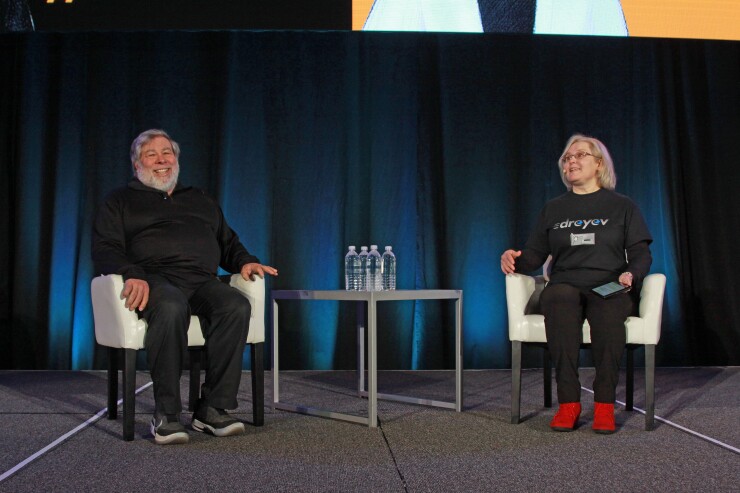While innovation is happening across insurance and other industries at a rapid pace, there's still room for improvement in the process, according to Steve Wozniak, co-founder of Apple and inventor of the Apple II.
In a fireside chat with Maggie Stys, founder of the insurtech Dreyev, at Digital Insurance's Dig | In conference in Austin, the Silicon Valley legend shared thoughts on why companies often fail to nurture new ideas and what they could do better.
Companies tend to make decisions based on shareholders, profits, and the bottom line, he lamented, when they should be focused on what human beings want.

"It’s like human concerns almost never come out," he said. "In my time at Apple, we always made computers that were easy to use. That meant, make them usable by humans intuitively without making them have to learn and memorize things. That meant the human was more important than the technology.”
Innovation often comes from a couple of young people working on an idea they believe in, but they don't always get the support they need.
“Companies do spreadsheets and say this is not going anywhere,” he said. “That’s what happened to us. I worked for HP and I wanted them so badly to build this personal computer and I got turned down five times. It wasn’t obvious that it was going to be as huge as it became. [The thinking was] little computers can’t do the jobs that people need computers for. But the low cost and some applications came out that made the market.”
Big-company CEOs generally work the bottom line and if a new thing comes along that doesn’t seem significant enough to affect sales, “it doesn’t get any attention from the CEO on down,” he said.
Companies should listen to employees’ ideas and encourage skunkworks projects, he said.
“If they come up with something big, even if it doesn’t apply to your company and your culture, you’ll own a part of it.”
And each large company should hire a chief disruption officer who reports to the board (not to the CEO), and a chief disruption department that is always looking at what might happen in the future, he said.
Create products you would want to use
The best indicator that a product will do well is, you want the product, he said.
“You’ve wanted it maybe your whole life and thought about it," Wozniak said. "So it's not just knowing what other people will think, it’s wanting it yourself. Look at Elon Musk. Why would you build an electric car large like the Tesla? He had a large family.”
Hiring engineers and inventors is critical, he said.
“Include the engineers in your business thinking,” he said. Too often startups come up with a business plan, raise money, venture capital, then hire engineers down the road, he said.
"The engineers are so trained at solving problems and going through long lists, testing, getting things to work, they’ll have a lot better suggestions,” he said. “So try to build in engineering when you start.”
It's the Inventor types who think, I wonder if this would be possible, he said.
“They usually have their own laboratory at home or in their garage or at work and they go in and test it out and see if it will work,” Wozniak said. “Those sorts of people are crucial to creating things that haven’t been done before.”
Privacy and pivoting
Wozniak, who is a co-founder of the Electronic Frontier Foundation, said that as companies adopt personalization technology, they should be mindful of people (like him) who care deeply about privacy.
“I don’t want my privacy interrupted by everyone trying to sell me something,” he said. “If I click ‘like’ on a link, I want it to be a link between me and the poster. We’ve got deception, and I’m into total truth, honesty and transparency. What the user thinks they’re getting is what they should be getting.”
Wozniak said he wants to see every advertiser, not just those a personalization engine has picked out for him.
He deactivated his Facebook account—not just for privacy reasons.
“Who needs 5,000 Facebook friends you don’t know?” he said.
Predictive analytics and AI can also be a problematic.
“As a creative person, you don’t want other people to say, ‘here’s what Steve is going to say next, here’s where he’s going to go when he leaves the room.’ I want to feel that I’m independent and I still have a little intuitive head that makes its own decisions. A lot of technology is against that and wants to say, ‘we already know.’”
Another tip: companies should be willing to pivot, he said.
“If you spot something that’s better, go the better direction,” Wozniak said. “Don’t be afraid to change because you’ve already been working on one thing. If you’ve been working towards a new type of product and it’s in your head how you constructed it—maybe you worked on it for six months, you got all these little details solved, they’re in your head, and you now wipe it out, restart and do a really clean piece of code in just a week or two because it stays in your head.”





